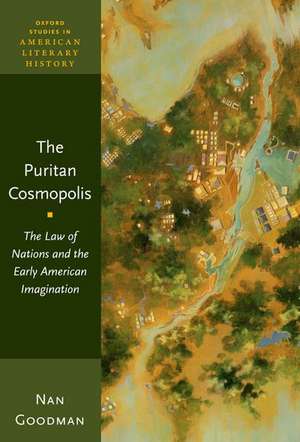The Puritan Cosmopolis: The Law of Nations and the Early American Imagination: OXF STUDIES AMER LITERARY HISTORY SERIES
Autor Nan Goodmanen Limba Engleză Paperback – 13 iul 2022
| Toate formatele și edițiile | Preț | Express |
|---|---|---|
| Paperback (1) | 165.91 lei 10-16 zile | |
| Oxford University Press – 13 iul 2022 | 165.91 lei 10-16 zile | |
| Hardback (1) | 496.64 lei 31-37 zile | |
| Oxford University Press – 5 apr 2018 | 496.64 lei 31-37 zile |
Preț: 165.91 lei
Preț vechi: 203.71 lei
-19% Nou
Puncte Express: 249
Preț estimativ în valută:
31.75€ • 32.73$ • 26.81£
31.75€ • 32.73$ • 26.81£
Carte disponibilă
Livrare economică 30 ianuarie-05 februarie
Preluare comenzi: 021 569.72.76
Specificații
ISBN-13: 9780197651209
ISBN-10: 0197651208
Pagini: 216
Dimensiuni: 226 x 150 x 15 mm
Greutate: 0.34 kg
Editura: Oxford University Press
Colecția OUP USA
Seria OXF STUDIES AMER LITERARY HISTORY SERIES
Locul publicării:New York, United States
ISBN-10: 0197651208
Pagini: 216
Dimensiuni: 226 x 150 x 15 mm
Greutate: 0.34 kg
Editura: Oxford University Press
Colecția OUP USA
Seria OXF STUDIES AMER LITERARY HISTORY SERIES
Locul publicării:New York, United States
Recenzii
...with the arrival of Nan Goodman's The Puritan Cosmopolis, no scholar will be able to play the exceptionalist Puritan card without getting laughed out of the room. ... The Puritan Cosmopolis is an ambitious and successful study... Because the law of nations-the conceptual category that frames her study-is not widely known or understood in early American scholarship, Goodman develops the concept at length.
Goodman's engaging monograph is a welcome addition to the developing field of global Puritan studies... she addresses broader questions about the interaction of instrumental legal theory and more speculative, imaginative ways of denoting political belonging.
[This book] makes for interesting reading, providing insight into some of the most interesting events in Puritan New England history.
In this ambitious book, Nan Goodman offers us an outward-facing, cosmopolitan Puritanism built on the internalized idea of belonging to the entire world. It is the next chapter in a bigger, broader Puritanism. But it is also a lively essay in affiliation, community, and imagination, reorienting central dimensions of Puritan culture while inviting us to reflect on our own experiences of belonging.
Puritans, we are often told, imagined early New England as a place apart. Nan Goodman tells a different story, of a vision that balanced the Puritans' well-known exceptionalism against the cosmopolitan lessons that they learned from the law of nations. Political, moral and even religious truths, it turned out, were not the exclusive province of God's elect but were available to men and women everywhere."
Nan Goodman's wonderful The Puritan Cosmopolis adds something radically reorienting to the body of innovative scholarship that has, in recent years, brought the New England Puritans back into contact with the outside world, variously reframing them in terms of transatlantic culture, hemispheric relations, global systems, and fraught associations with their indigenous neighbors.
In this compelling re-reading of the New England Puritans, Nan Goodman brilliantly ranges across seventeenth-century conceptions of international law, relations with the Ottoman empire, and theologies of history. Highlighting literary uses of the law, she offers us an engaging argument that Puritans may yet inform Americans today about the very meaning of cosmopolitanism.
Goodman's engaging monograph is a welcome addition to the developing field of global Puritan studies... she addresses broader questions about the interaction of instrumental legal theory and more speculative, imaginative ways of denoting political belonging.
[This book] makes for interesting reading, providing insight into some of the most interesting events in Puritan New England history.
In this ambitious book, Nan Goodman offers us an outward-facing, cosmopolitan Puritanism built on the internalized idea of belonging to the entire world. It is the next chapter in a bigger, broader Puritanism. But it is also a lively essay in affiliation, community, and imagination, reorienting central dimensions of Puritan culture while inviting us to reflect on our own experiences of belonging.
Puritans, we are often told, imagined early New England as a place apart. Nan Goodman tells a different story, of a vision that balanced the Puritans' well-known exceptionalism against the cosmopolitan lessons that they learned from the law of nations. Political, moral and even religious truths, it turned out, were not the exclusive province of God's elect but were available to men and women everywhere."
Nan Goodman's wonderful The Puritan Cosmopolis adds something radically reorienting to the body of innovative scholarship that has, in recent years, brought the New England Puritans back into contact with the outside world, variously reframing them in terms of transatlantic culture, hemispheric relations, global systems, and fraught associations with their indigenous neighbors.
In this compelling re-reading of the New England Puritans, Nan Goodman brilliantly ranges across seventeenth-century conceptions of international law, relations with the Ottoman empire, and theologies of history. Highlighting literary uses of the law, she offers us an engaging argument that Puritans may yet inform Americans today about the very meaning of cosmopolitanism.
Notă biografică
Nan Goodman is Arts and Sciences Professor of Distinction and Professor of English and Jewish Studies at the University of Colorado Boulder. She is the author of Banished: Common Law and the Rhetoric of Social Exclusion in Early New England (2012), and Shifting the Blame: Literature, Law, and the Theory of Accidents in Nineteenth-Century America (1998).
